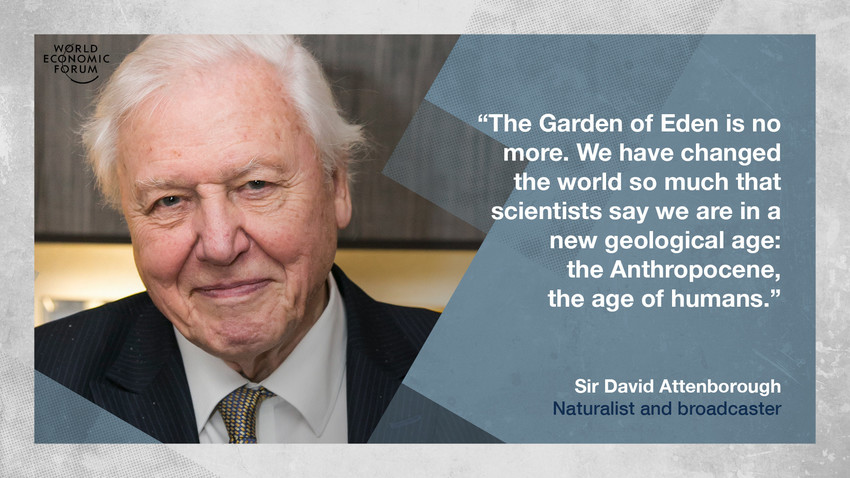David Attenborough about the Climate Crisis: 'The Garden of Eden is no more'

Speech from Chrystal Awards in Davos, January 2019
“ Thank you, Professor Klaus Schwab, Hilde Schwab and the World Economic Forum for this generous award and inviting me to Davos.
I am quite literally from another age.
I was born during the Holocene- the name given to the 12,000-year period of climatic stability that allowed humans to settle, farm and create civilisations.
Those conditions fostered our unique minds, giving rise to international trade in ideas as well as goods making us the globally-connected species we are today.
Much of what will be discussed here is the consequence of that stability.
Global businesses, international co-operation and the striving for higher ideals these are all possible because for millennia, on a global scale, nature has largely been predictable and stable.
Now in the space of one human lifetime - indeed in the space of my lifetime all that has changed.
The Holocene has ended. The Garden of Eden is no more.
We have changed the world so much that scientists say we are now in a new geological age – The Anthropocene - The Age of Humans.
When you think about it, there is perhaps no more unsettling thought. The only conditions modern humans have ever known are changing and changing fast.
It is tempting and understandable to ignore the evidence and carry on as usual or to be filled with doom and gloom. But there is also a vast potential for what we might do.
We need to move beyond guilt or blame and get on with the practical tasks at hand.
We did not get to this point deliberately – and it has happened astonishingly quickly.
When I made my first television programmes most of audiences had never even seen a pangolin - indeed few pangolin had ever seen a TV camera!
When in 1979 I made a series tracing the history of life on earth, I was aware of environmental problems but I didn’t imagine we were fundamentally changing nature.
In 1999, whilst making the Blue Planet series about marine life, we filmed coral-bleaching, but I still didn’t appreciate the magnitude of the damage that had already started.
Now however we have evidence, knowledge and the ability to share it on a scale unimaginable even just a few years ago. Movements and ideas can spread at astonishing speed.
The audience for that first series, 60 years ago, was restricted to a few million viewers in southern England.
My next series - Our Planet- which is about to be launched, will go instantly to hundreds of millions of people in almost every country on Earth via Netflix.
And the evidence supporting the series will be free to view by everyone with an internet connection via WWF.
If people can truly understand what is at stake, I believe they will give permission to business and governments to get on with the practical solutions.
And as a species we are expert problem-solvers. But we haven’t yet applied ourselves to this problem with the focus it requires.
We can create a world with clean air and water, unlimited energy, and fish stocks that will sustain us well into the future. But to do that we need a plan.
Over the next 2 years there will be United Nations decisions on Climate Change, Sustainable Development and a New Deal for Nature. Together these will form our species’ plan for a route through the Anthropocene.
What we do in the next few years will profoundly affect the next few thousand years.
I look forward very much to the discussions and insights this week.
Thank you again for this great honour. “




